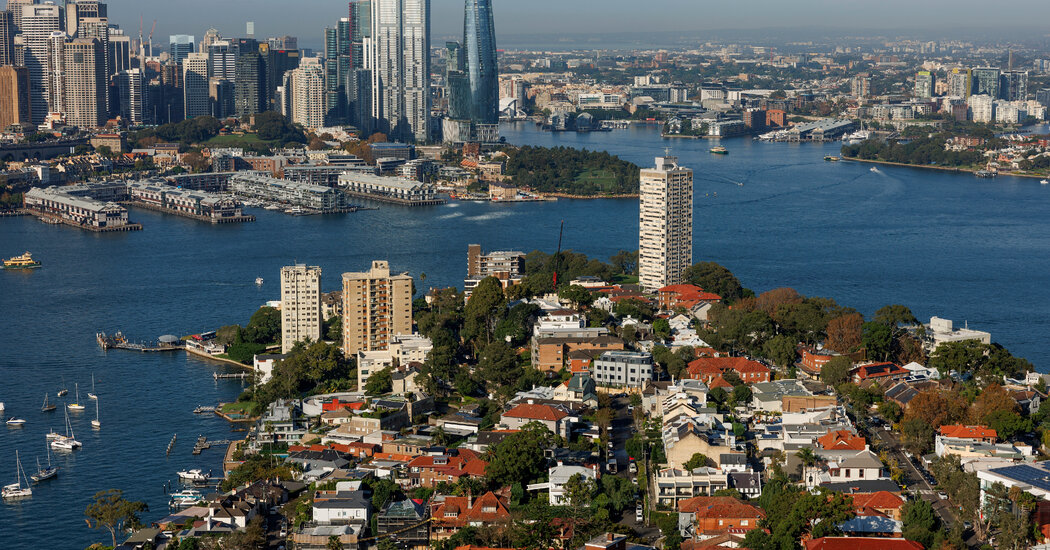Marcus Neil bought his first home, on the outskirts of Brisbane, Australia, in his late teens with little money and financial know-how but a strong sense that he was working toward future stability. Decades later, he owns four investment properties, which he hopes will be his safety net when he retires.
“I just see it as a really, really safe bet,” said Mr. Neil, 53.
He has been on the money. Australia is now one of the most expensive places in the world to own a home.
But the sky-high values have priced many people out of the housing market and caused an affordability crisis, particularly for younger Australians. They have been exasperated by statistics like the one that shows the typical Australian home costs about eight times the median income — making it a more expensive real estate market than New York’s. These citizens have a chance to demand change on Saturday, when Australians head to the voting booth.
For the first time here, millennials and Gen Z voters will outnumber baby boomers in a federal election. But it is unclear to what extent this demographic change will sway results. Recent polls indicate Prime Minister Anthony Albanese is likely to win re-election. The opposition leader, Peter Dutton, whose campaign took cues from President Trump, has seen his support fall as Mr. Trump’s policies have unleashed global tumult.
Some young voters are all too aware of this. “All I can see is house prices going up and even more up,” said Lamisa Islam, 24, who lives with her parents in a southwestern suburb of Sydney while she saves up for her own place. “My little piggy bank will again fall far, far behind.”
Saul Eslake, an independent economist, distilled the country’s approach to real estate, saying “In Australia, housing has become seen as a vehicle for accumulating paper wealth rather than something which satisfies a basic human need.”
There are other factors beyond property investors, of course. The biggest problem, many say, is a dire lack of housing supply, which has been made worse by a range of issues like complex zoning and planning laws, a recent shortage of labor and building materials, existing homeowners resistant to new construction in their neighborhoods, and a shortage of viable land in a country where most of the population is crowded into a small number of cities. A decades-long population boom, fueled by immigration, has also increased demand for housing.
On the campaign trail, both Mr. Albanese, of the Labor Party, and Mr. Dutton have vowed not to change tax laws that many economists say have fueled speculation in real estate.
One of these is a tax law called negative gearing, which allows those investing in property to claim losses associated with it, including interest expenses, as deductions. Another concession for real estate investors: They receive a discount on the capital gains tax charged on the sale of a home. Although other countries, including the United States, offer similar tax breaks, economists say the ones in Australia are unusually generous.
Both major parties have announced policies to boost housing supply or infrastructure. But at the centerpiece of their election platforms are proposals that will help first-time home buyers.
Mr. Albanese, the leader of the center-left Labor Party, has pledged to expand a program to allow new buyers to purchase a home with as little as 5 percent down. Mr. Dutton, who is the head of a conservative coalition, has promised to allow first-time buyers of newly built homes to claim tax deductions on their mortgage interest repayments.
These policies are “only going to increase demand, which will push up prices,” said Steven Rowley, a property professor at Curtin University in Western Australia.
Jerath Head, 37, a renter in Melbourne, said that he found both major parties’ housing affordability policies lackluster. Still, he said, he might vote for Labor over a minor party or an independent, if only to ensure that Mr. Dutton’s Liberal Party did not take power.
For Mr. Head, who worked as a writer and editor but recently made a midlife career change and returned to school to study medicine, homeownership feels completely out of reach.
“It’s so far beyond where I think I’m at, at this point in my life, that it’s not even something that registers,” he said.


